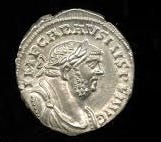A Roman Usurper
History may not repeat itself - but sometimes there are striking similarities.
This is Marcus Aurelius Mausaeus Carausius, self-styled Emperor of the North, who ruled Britain and parts of Belgium and northern France from AD 286 till his death in AD 293. You may not have heard of him, but bear with me. His period of power has much to tell us, about usurpation, treachery and even propaganda. If you note any parallels with current events in our world, I’m there with you.
Take a deep breath…
Carausius was born sometime in the mid-third century, into the Menapii tribe of what is now Belgium.
Growing up by the coast, he may have found it natural to join the Roman navy, a steady job in a time of turmoil. He quickly rose in the ranks, and after success in battle was put in charge of the classis britannica, the fleet protecting Rome’s North Sea and Channel waters. At this point, he began to use state institutions to feather his own nest.
It is recorded that Carausius used his position to turn a blind eye to private raids, and then capture the stolen treasure for himself. Having been convicted as a felon, he escaped justice by simply grabbing power in AD 286. In his day, this would mean taking control of the military, rather than rail-roading an elective body: in this instance, the three British legions. Such an exercise in sweeping executive power flew in the face of all Roman constitutional and legal precedent. And by calling himself “Emperor”, he was able to hold his powerful military force via their prior sworn oaths to the Imperial throne.
As self-proclaimed Emperor of the North, Carausius now consolidated his political power by the clever use of propaganda. He had coins struck in his image, declaring himself “Restorer of Britain”, and “Peace-bringer to the World”. Coinage being the red caps and social media of the period, he portrayed himself the co-equal of the bona fide existing Roman co-emperors of east and west, Diocletian and Maximian.
Pevensey Castle, in Sussex, may have been established by Carausius as part of his defences.
Carausius, like modern-day autocrats, had a catch-phrase that was designed to appeal to the labouring classes of his time: he told them “the Golden Ages are back”. And for a while, it seemed so. To help him secure his position, he seized provincial assets and appointed a treasurer to re-allocate imperial funds to maintain his own position.
The chosen (unelected) financial whizz was one Allectus. He began by standing shoulder to shoulder with Carausius. But — and you’ll have guessed this bit — the two soon fell out. In AD 293, Carausius came to a sticky end when he was assassinated by his buddy Allectus. Allectus took power, only to suffer the same fate a few years later.
Britain and Gaul were quickly gathered back into the Roman fold and, for better or worse, survived as imperial provinces for another century or more. Britannia had a final moment of Roman imperial glory when Constantine the Great was proclaimed emperor, by the British legions at York in AD 306.
Is there a moral in Carausius’s story? Maybe — you can fool all of the people some of the time, and some of the people all of the time. But when the fooled and betrayed come to their senses, you’d better watch out.
My February News
Update on The Silver Mirror
I’ve got to the sticky mid-point crisis in my new Roman Britain mystery. We’ll be rolling downhill from this point (once I’ve worked out how the complexities of the plot unwind themselves!) I have a deadline at the end of April to deliver the MS to my lovely new publishers, Sapere Books. They’ve also contracted me to write another two books in the Otto Cornelius series, all set in and around wonderful Viroconium Cornoviorum (Wroxeter Roman city, as seen below).
Meanwhile, Quintus and friends are being dusted down, to re-appear in my fourth Quintus Valerius mystery, expected in 2026. So plenty more Roman Britain mystery and action to look forward to!
Ross on Wye Book Fair
If you’re anywhere near Ross-on-Wye, Herefordshire, on Sunday 17th August, do drop in to see me. I’m sharing a table with crime/fantasy writer, PR Ellis. We’ll be chatting to readers, signing books, and talking all things bookish and about writing, from 12 to 4pm at Larruperz Community Centre, HR9 7QD.
The third in Jacquie’s Quintus Valerius Roman Britain mystery series, The Loyal Centurion, is out in ebook and paperback. The first in her new Otto Cornelius series, set in Roman Wroxeter, is forthcoming from Sapere Books. You can find all her books and short story anthologies, follow her on social media, watch her research videos, and read her magazine articles at Linktree.
[image credits; photos 1-4 Wikimedia Commons; 5-7 author’s own.]











It’s interesting to note that two modern day novels set in the time of Carausius depict him as a great man. The Silver Branch by Rosemary Sutcliff and Caesar of the Narrow Seas by John Gloag are two such examples. Alecto’s in contrast does not fare well at all!
Well done, Jacquie!
Judging by the coin, there's even a degree of physical similarity...